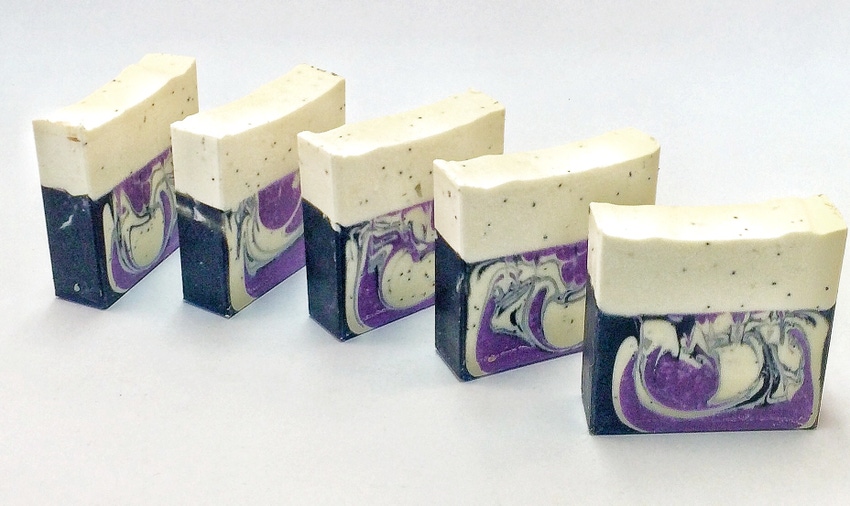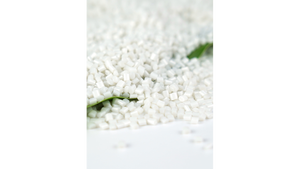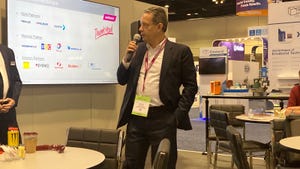Soap Opera: How Ford Engineer Camilla Rice Cleans Up With Her Own Soap Company
Inspired by her son's eczema, Ford engineer Camilla Rice launched her own line of organic soaps.
March 5, 2020

|
Ford Powertrain Program Planning engineer Camilla Rice, in her alter ego as an organic soap purveyor. Image source: Green Olive Soaps |
Design News: How did you get interested in engineering and cars? Were you interested in other kinds of engineering and how did you pick automotive engineering?
Camilla Rice: That goes back to my childhood. I was a very curious child. My mother said that it was difficult to raise me because there was nothing that could stop me from doing something that I was interested in. So I did a lot of, like, science experiments that some worked out some didn’t and blew up.
I really struggled with wanting to be either an engineer or a doctor. And because I grew up in a very poor background, being a doctor would have cost too much money. So I chose to go on
engineering, and I haven't really regretted that.
I majored in systems engineering at what is now called Kettering University. It was GM Institute when I was there. Being a manufacturing systems engineer, you get to be like a jack of all trades.
I never really wanted a job where I was staying at one particular job. I've always been curious and wanting to jump around. So that's how my career has pretty much gone from TRW to GM and to now at Ford.
DN: What were some of the projects you worked on at TRW when you were a young engineer?
CR: I was a co-op student, and one of the best jobs I had was working on quality gauging. That was what really let me know I wanted to be in manufacturing systems, because in that process they gave me full autonomy for hours, telling management, what the cases were going to be, how much they're gonna cost for the entire plant.
That paved the way for me to kind of grow into the person that I am today, not only from the engineering side but also on the business side.
To do those gauges, I have full control of my schedule so I didn't come in the same time as most co-ops. I came in probably around nine and I leave at five o’clock, I was able to work at home on some occasion and I will get paid for because I was a co-op student. I really enjoyed that particular project, that that that was one of my favorites.
DN: What was involved in doing the gauging work for the for the plant?
CR: They really, at that point in time, had no idea why gauging was even required. So, the small tools and gauges that they would use to calibrate, to check their equipment, they were hand gauges. They wanted them to be more organized so I came up with this idea of creating “days trays” and with the budget that they had given me I went out and sorted out suppliers and how much it cost. I came under budget!

As a student, Rice organized manufacturing for TRW. Image source: ZF
It was just for me a project where it was the first time I felt like, “Wow, you know what? I can do this!” and two, I wasn’t really pegged into an engineering job. I still have to do management, which fit into my manufacturing systems role.
Three, it taught me that I really like having more empowerment to make decisions in the workplace. I think I was probably 19 or 20 at the time. So at a very young age, they really helped mold me to the person that I am today. It really was one of the best jobs or assignments I can think of throughout my career and probably be because it was such a critical point.
DN: Then you graduated and you got a job at GM. So what did you do there?
CR: So at GM, I started off at Flint metal center. And I started off as a product engineer. In that particular job we specialized in sheet metal. It's funny because to this day, I still look at sheet metal differently than a lot of people, when you buy a vehicle.
I was a quality engineer over sheetmetal and I did that for maybe a year or so and then they put me in a program where I rotated. I really liked that that particular role because it let me see where I wanted to go. Anything from supervision, I did that for a while, to working in the cradle area, to working back in hoods and sheetmetal to eventually going on to purchasing.
So I I've always jumped and being at GM wasn’t any different. I think the most I ever stayed [in a job] was maybe a maybe a year or so.
DN: So they were already grooming you at that time to move on to the bigger things, because they were moving you around?
CR: I tend to get bored fast too. And I used to, in my younger years, not that I'm old!, but in my younger years in my 20s, the jobs weren’t boring . But I think it just for me, I tend to get bored a lot faster when I learned something and then there's no more learning curve. And that job? I'm done. Its just like move on to something else. So with them having me on that program was awesome.

At General Motors, Rice participated in purchasing moonroofs and convertible tops like the one on this 2005 Chevrolet Corvette. Image source: General Motors Co.
Then when I moved over to purchasing at GM, it was on a promotion. I didn't quite like that job to be honest. I liked the job, but not the culture.
The culture was a little bit dogmatic. At that point in time, it's not like that now, I still know a lot of people at GM. But when I was there, it was dogmatic. It wasn't the friendliest culture. So when I wanted to start a family, that was critical to me moving to Ford, because I really wanted a culture that was more sensitive to people growing a family and a culture that was more kind-hearted.DN: When did you go to Ford and what made you want to do that?
CR: I moved over to Ford in September 2006, and it was to start a family. My daughter was born in February 2007. That was the main reason for going to Ford. I wanted to start a family. I wanted a job or culture that was suited to people having families and that same time, not costing me my career path.

At Ford, Rice continued purchasing moonroofs and convertible tops for cars like the Mustang. Image source: Ford Motor Co.
Ford was great. And me having a child and feel developing in my in my career in purchasing at Ford. I literally jumped from convertible tops and moonroofs at GM to convertible tops and moonroofs at Ford. So a different team but I did the same role.
I stayed in purchasing for four or five years total. Part of that was when the economy, unfortunately fell, and I did a job with management and purchasing and I loved that role. That role was one yet again where I was able to use a variety of different skill set. It wasn't just a typical purchasing role where you're trying to secure savings from the supplier.
It was more of a role of you helping the supplier stay afloat. And then also using my manufacturing background skill and knowing their demand at their plant, so I can speak about, you know, their optimization of people on the line.
The manager there was really awesome. And then he was the one who said, it's time for you rotate out. And he helped me jump over to product development.
DN: What are you're doing now?
CR: I’m doing a lot of product development. I'm on the modular architecture team. When I originally jumped to product development in powertrain, I did head count, and then I moved on and did work planning for vehicles and systems
And then I just recently moved over to this role for the smart redesign and modular architecture last July.
DN: What are you doing for the Modular Architecture team?
CR: I love working on on on the modular team. It gives the another perspective and seeing how the company is really moving for, our costs to be optimized. You know, we were looking at not just engine and transmission now, there's a full system to see. When you are developing a new product line, you are optimizing the top and reusing those same modulars and products. So that's the role that actually play in ensuring that the team is using the right modular. It is not just me, it is a team of six of us.
My primary role in the group is working on reducing variations from the modular catalog. And I really like it because it does give me a perspective that I didn't have prior and that is how systems are chosen for future models and also in working closely with top management.
So it is definitely a career Development path, and I have great management and I'm in an amazing team of people. So it's pretty great, and I don't plan on moving anytime soon. Unless they move me out!
And my managers are really supportive too of my entrepreneurship, too. So that that's, that's another reason why I don't plan on moving because that's kind of rare to find.DN: Do you have any observations about any challenges or obstacles along the way in your career, in terms of your gender or your ethnicity, or anything like that being different from the majority of your colleagues?
SR: I have experienced in the past, as a woman in automotive, as a black woman to add that second layer to it, I have experienced racism in the past, I have experienced gender biases in the past.
I would say currently that's not the culture. That's not my experience. I would say that, for instance in the group I am in now, there's four working employees. Two of us are African American female. One is Asian American and one is a Caucasian American. So out of the four, it’s very diverse. There’s male, there’s female, there's different ages. I've never seen in this job and most of my jobs in power train, I haven't experienced that much of issues regarding gender bias. I will say there is a definitely a culture of inclusiveness.
Now, what I really like with my chief; she’s amazing. There are events that you can come and find out more about who your colleagues are, and what their culture is. I really like that because in the past, you would feel odd to even ask. I was never like that. I've always been curious about other cultures and different people and languages and even different foods and stuff. So I've been very open and comfortable with asking to know about that. I love the fact that now there are actual events held to figure out how someone is different from how you are.
Or even, people who grew up differently. A lot of people didn’t know I grew up poor until they start reading the articles. And I was like, “Yeah, there was poverty. And then there was me, below poverty.”

Rice in her soap store, with her first customer. Image source: Green Olive Soaps
DN: Speaking of articles about your enterprenuership, what did you know about soap, now that you have started your own organic soap company?
CR: Absolutely nothing! I knew nothing about it, so it was the last thing on my mind to be honest. My son was born October of 2014. And when he was born, a month later, he started developing eczema all over, he had it on his hands, his face, his eyelids, his legs, it was just all over.
I knew nothing about skincare or anything else. I kept taking them back to the doctor, the dermatologist. They were prescribing him all these medications that had steroids and it wasn’t really helping his skin. I do remember reading one of the labels and it said “May affect growth.”
And that freaked me out. I was like, “Wait a minute!” So that’s when I started to research alternatives to what I could put on his skin that will help. So I researched and found out about soaps, and creams like body butters that you can put on the skin that was natural. So I was buying a lady’s soap, she made a handmade soap and because it was natural, I can read the ingredients.
The only problem with their her bar soap was three ounces and it was $15. And that was just super expensive. And after a while, I think that I was complaining to one of my girlfriends and she said, “Well, make your own soap.”
“Oh, who does that? I don't have time for that! I’m an engineer. I’m working. I don’t have time for that.”
I eventually bought myself a soap kit, made the soap that was in the kit. But I quickly found out that that kit had perfume, which my son cannot use and then some of the ingredients he couldn’t use.
And so I asked my girlfriends to help me balance out a recipe that I could make that was natural. And so I went to the librarary, and found a recipe how to make a recipe for soap and the rest is history.
So the first bar was the oatmeal milk and honey bar that I sell now as the unscented version and it has whole grain oats and honey and no fragrances. After using it for a couple months, his skin did start to clear up. I thought, “Oh, this is great!”
A lot of people love the body butter that I made because I tested that for six months on all different skin types, all different ethnicities, all different ages. I wanted a body butter that was non-greasy because a lot of them are greasy. My body butter is amazing. It has mango, shea butter and avocado oil, which are all great and full of vitamins.
And I also use arrowroot, which you can even eat! Arrowroot is halal, it is kosher, it is vegan, a little bit of it goes a long way. In body butter, what I found is that it helps create a silkiness to the butter so it's not greasy. So I use that on his skin, in conjunction with the soap, and his skin has, over time, gotten better and better.

Image source: Green Olive Soaps
DN: How much business do you do and where is your product sold?
CR: Okay, well my product primarily is sold on my website, which is GreenOliveSoaps.com.
I also now have a store that it's open just on the weekends or Fridays and Saturdays so people in the area can come and purchase those.
I have outgrown space in my house. which is awesome. And then I'm I am currently in two stores but I'm expanding. I’ve got quite a few offers since the story went viral. And then as far as like the volume, we get 10 to 20 orders. So I am looking to hire some people part time for labeling and also help do shipments.
It is a blessing because it's good to be able to help somebody else have a job and earn some money while your business grows. I never thought I would be someone’s boss! That's a little bit different, but I'm here I currently have a part time employee.
It has been an adjustment trying to juggle both (jobs) now that there's so much growth but making soap for me, is not a lot of work. I've always had problems with sleeping, and when I when I make soap at night, it really kind of calms me down enough to where I can go to sleep. It’s really very therapeutic and it really doesn't feel like work at all.
I was saying the only thing that feels like work is making the body butter, because those are made in a heavy bag. So that that’s work pouring them into the container. But soap, making them into cakes and soap bars, that’s just fun!
RELATED ARTICLES:
Dan Carney is a Design News senior editor, covering automotive technology, engineering and design, especially emerging electric vehicle and autonomous technologies.
About the Author(s)
You May Also Like



